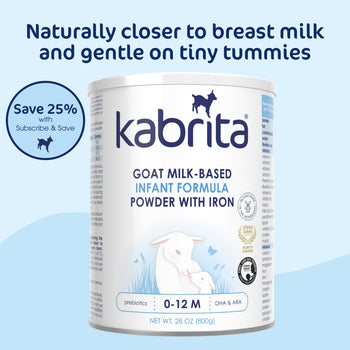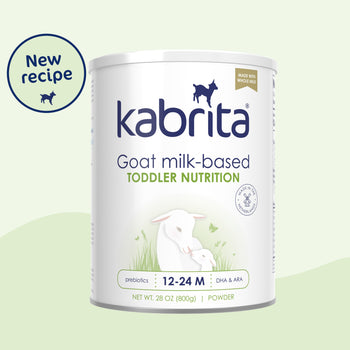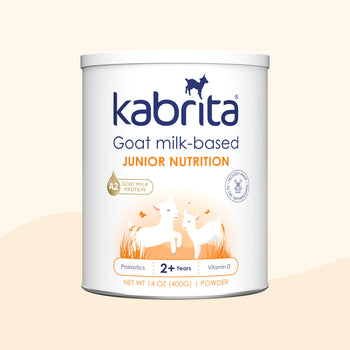Lactose Intolerance is Uncommon in Young Children

A disproportionate amount of baby formula available to consumers is either reduced-lactose or lactose-free, despite lactose intolerance being uncommon under the age of 3. Lactose is the primary carbohydrate found in mammalian milk and is an important source of energy, particularly for babies. Carbohydrates are essential for healthy baby’s development. If formula manufacturers chose to reduce or remove the amount of lactose in formula, it must be replaced with a different carbohydrate source. Common examples of lactose replacements include maltodextrin, corn-syrup solids, brown rice syrup and sucrose.
Benefits of Lactose
Supporting energy requirements is an important benefit of lactose. Many studies also support that lactose may help calcium absorption and bone mineralization.1,2,3 Lactose also appears to support gut health by increasing the growth of beneficial bacteria.4 So before going lactose free, it’s worth exploring your options!
How rare is congenital lactase deficiency or galactosemia in infants?
It is estimated that congenital lactase deficiency and classic galactosemia occurs in about 1 out of 60,000 births. Symptoms of congenital lactase deficiency or galactosemia include diarrhea, poor weight gain, dehydration, and lethargy. Most babies in the US undergo a newborn screening shortly after birth (heel stick), which tests for many genetic disorders, and often includes screening for galactosemia. Babies who are diagnosed with galactosemia are immediately offered an elemental or soy-based formula that does not contain lactose.
Can babies have a milder case of lactose intolerance?
Certainly, more moderate, or mild intolerances can occur, but not as often as you might think! Most babies are born with sufficient lactase enzyme to digest lactose. There are some exceptions; for example, some premature infants do not make enough lactase at the time of their arrival because this part of their digestive system is also premature. In these instances, they may benefit from a reduced lactose or lactose free formula.
Why is there so much reduced-lactose formula available in the US market?
Good question! There could be several reasons for this; one of them being that the US has looser restrictions on carbohydrate sources in formula than the European Union.
The European Commission maintains that lactose is the preferred carbohydrate in standard formula and suggests that at least 50% of all carbohydrates in formula come from lactose. The European Commission also sets limits on the amount of glucose (such as glucose syrup) and sucrose that can be added to formula, and only typically allows these forms of carbohydrates in hydrolyzed formulas. In comparison, the US is more accepting of alternative carbohydrate sources to lactose, maintains no minimum lactose requirement in formula and does not set limits on the percentage of glucose or sucrose that make up total carbohydrate requirements in formula.

It is estimated that over half of all formula consumed in the US is lactose-reduced.5 Reduced-lactose and lactose-free formulas are often marketed as ‘sensitive’ formulas and commonly contain maltodextrin and glucose syrup solids as an alternative carbohydrate source to lactose. While lactose-free and reduced lactose formulas are required for a small percentage of babies, there is simply more reduced-lactose formula being offered than there are lactose intolerant babies who need it.6
Kabrita is proud to be made from European ingredients and lactose is the primary carbohydrate in Kabrita Goat Milk Toddler Formula.
1) Kwak H, Lee W, Lee M. Revisiting Lactose as an Enhancer of Calcium Absorption. International Dairy Journal. 2012;22(2):147-151
2) Abrams S, Griffin I, Davila M. Calcium and Zinc Absorption from Lactose Containing and Lactose-Free Infant formulas/ The American Journal of Clinical Nutrition. 2002;76(2):442-226
3) Romero-Velarde, E., Delgado-Franco, D., García-Gutiérrez, M., Gurrola-Díaz, C., Larrosa-Haro, A., Montijo-Barrios, E., Muskiet, F., Vargas-Guerrero, B., & Geurts, J. (2019). The Importance of Lactose in the Human Diet: Outcomes of a Mexican Consensus Meeting. Nutrients, 11(11), 2737
4) Romero-Velarde E, Delgado-Franco D, García-Gutiérrez M, et al. The Importance of Lactose in the Human Diet: Outcomes of a Mexican Consensus Meeting. Nutrients. 2019;11(11):2737
5) Alexander Strzalkowski, Bridget Young, Lactose-Reduced Infant Formulas Are Over-Consumed Whereas Hypoallergenic Infant Formulas Are Not - When Compared to Medical Necessity, Current Developments in Nutrition, Volume 5, Issue Supplement_2, June 2021, Page 820, https://doi.org/10.1093/cdn/nzab046_117
6) Alexander Strzalkowski, Bridget Young, Lactose-Reduced Infant Formulas Are Over-Consumed Whereas Hypoallergenic Infant Formulas Are Not - When Compared to Medical Necessity, Current Developments in Nutrition, Volume 5, Issue Supplement_2, June 2021, Page 820, https://doi.org/10.1093/cdn/nzab046_117



